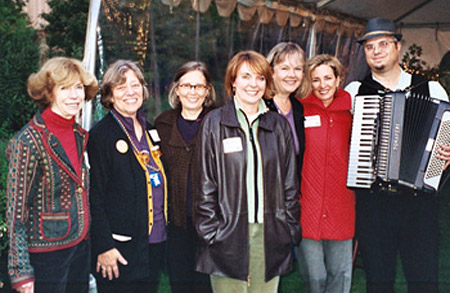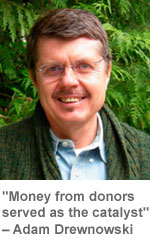In the late 1970s, Mary Porter ('79) and her classmates studied nutrition as undergraduates at the University of Washington. They went on to work for hospitals and school districts or to run their own restaurants – ensuring patients, children and customers ate healthy foods. A few years later, the UW, citing costs, eliminated the undergraduate nutrition program.

Former SPH Dean Pat Wahl, Barbara Lloyd '79, Marilyn Ferguson-Wolf '79,
Mary Porter '79, June Bartell '79, Kathy Kingen '79 and accordionist Steve Rice
Porter and her friends were the last of an era, as food and nutrition courses vanished from schools across the country. "A lot of college students these days don't know where food comes from," said Porter, who majored in Clinical Dietetics. "Food [to them] was always in the grocery stores."
Meanwhile, the nation got fat.
According to the Centers for Disease Control and Prevention, obesity rates doubled among U.S. adults from 1980 to 2004, although the rate of increase has tapered off the last few years. Today, one of every three U.S. adults and about 17 percent of children and adolescents are obese, a condition that increases the likelihood of other health problems, from heart disease to diabetes. Experts blame many factors, from a diet high in fatty, sugary foods to a built environment that discourages walking in neighborhoods.
Now, undergrad nutrition courses are back – this time offered at the School of Public Health, thanks in part to efforts by Porter and her classmates. "I'm convinced the UW is the best place to get a nutrition education," said June Bartell ('79), who majored in the Coordinated Undergraduate Program in Dietetics. "The professors, the staff, are fabulous. Adam [Drewnowski, director of the Center for Public Health Nutrition] is internationally renowned. We need to be the ones training people to help change what's going on."
One of every three U.S. adults is obese
Bartell, Porter and other classmates had lost touch over the years, but they began meeting again in 2005, encouraged by the dean's office at the School of Public Health. They started with a small reunion at Northwest Hospital, where Porter works as manager of food and nutrition services. "We ended up talking for several hours about nutrition and how disappointed we were that the UW dropped the program and how it was needed," Bartell said.
The Nutritional Sciences Committee, as it came to be known, began meeting three or four times a year. Other key members include Kathy Kingen ('79), Barbara Lloyd ('79), Bob Thompson ('70) and Marilyn Ferguson-Wolf ('79).
Several alumni have German roots and love Oktoberfest, Bartell said, so a small fall fund-raiser seemed a good way to help the school raise money. Bartell and her husband, George, hosted the event at their Bellevue home in 2008. About two dozen people attended and raised more than $50,000. The Oktoberfest fundraiser has been held annually since. So far, the committee has raised more than $180,000, which has helped fund several new courses.

"It wasn't easy," said Kingen, a nutrition major who co-owns the Salty's seafood restaurants. "We've been working on it for years." The challenge, she added, was not the message, but getting it out. The committee contacted alumni, friends and dietetic associations for support. "There's no donation that's too small," she said.
A single course costs at least $25,000, which covers 12 percent of the instructor's salary as well as teaching assistants, according to Dr. Drewnowski. The UW has long had a basic nutrition course, NUTR 300, Nutrition for Today, which was a requirement for nursing students. Today it's the flagship nutrition course, with enrollment topping 700. The UW also offers leading graduate programs, including interdisciplinary MS and PhD degrees in nutritional sciences and an MPH in public health nutrition through the School of Public Health.
In Spring 2009, alumni and donor support meant the school was able to add NUTR 302, Food Studies: Harvest to Health, to the undergraduate curriculum. The course explores the journey food makes from its source to the consumer, and looks at agricultural, geopolitical, social and economic factors. Then came NUTR 303, Neighborhood Nutrition, taught by Drewnowski, which explores where people get food and what influences their decisions.
Funds from other sources also were used to support those courses, while additional classes – including molecular gastronomy and sports nutrition – were added. "Money from the donors served as the catalyst, helping spark more initiatives and multiplying undergraduate offerings," Drewnowski said. Faculty and alumni hope to build a "kitchen laboratory" on campus where students can gain first-hand experience about the science of cooking.
The impact of these new courses could be far-reaching. Alumni say nutrition should be studied by more people because the knowledge can be applied to any field. "As I tell my students," Drewnowski said, "you may not be devoting your career to health. But whatever you study – computers, engineering, whatever – you will surely involve nutrition, fitness and well-being."
In the future, members of the Nutritional Sciences Committee say they will consider reaching out to younger people through social media and might try raising funds to support scholarships.
Want to get involved in this project?
Contact Karen Kirsch at karenk23@uw.edu for more information or make an
online contribution to the Nutritional Sciences Undergraduate Program Fund.
